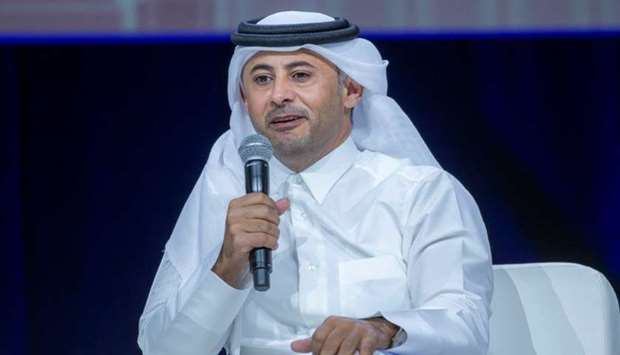Aspire Zone Foundation (AZF) participated in the fifth edition of Qatar Information Technology Conference and Exhibition (Qitcom 2019), which concluded at the Qatar National Convention Centre on Friday.
Highlighted during the event was Aspire Zone’s “story as a smart sports city” being a typical example of urban transformation.
AZF CEO Mohamed Khalifa al-Suwaidi was one of the main speakers at the session, “Thinking big: large-scale urban development and mega-events”, held on the second day of the conference. It was an opportunity to exchange ideas on this important subject, which is closely related to Doha in general and Aspire Zone in specific.
He started by saying, “When I received the invitation to join you on this panel, I was so excited as I find the story of Aspire Zone as a ‘smart sports city’ a typical, live example of the topic of this session, demonstrating how mega events act as catalysts for urban development.”
He elaborated on the fact that not all the examples are successful ones in terms of mega-events contributing to the urban development of the host country. In the end, mega-events “are considered more of a stress on the cities, testing their limits to meet the huge demand during those events – what we call the winners’ tears”, he observed.
Very few could make use of the mega events to develop their cities and sustain their legacy. Barcelona is one of those few examples, hosting the 1992 Olympics.
Doha is another typical example of the successful stories utilising mega events for urban development. It even contributed to the city’s branding as ‘Home to Sports’. This refers in specific to the 2006 Asian Games and the area of Aspire Zone, al-Suwaidi stressed.
He added, “When AZF hosted the Asian Games in 2006, actually the same doubts were faced. People in Qatar were questioning the country’s ability to benefit from the legacy of that mega event after it was over. Yet, AZF significantly managed and sustained the legacy in an unprecedented way.
“Now, the footfall in this area is the highest in the country comparing to other areas in Doha. The public come and enjoy the facilities that are continuously open for them.”
Al-Suwaidi shared some thoughts essentially around three main ideas: Smart Vision, Smart Transformation and Smart Legacy Management.
Essentially, it all started with a ‘smart’ vision. “Qatar’s leadership was truly visionary when it decided to establish an all-inclusive sports city, seeing in sports an indispensable pillar for the nation’s development and advancement,” he said.
This is “what makes Aspire unique: the unparalleled combination of sports development, education, sports medicine and facilities management represented by three member organisations - Aspire Academy, Aspetar and Aspire Logistics, together under one umbrella, which is Aspire Zone Foundation”.
“Such integration exists nowhere else in the world,” he added.
The transformation was also ‘smart’, creating a connected eco-system within the sports city. Aspire Zone is in fact a ‘small city in the city’. “We have a school, a hospital, a mall, a hotel, a park, a stadium - all within walking distance!”
“Enormous results have been seen in the Aspire Zone area, especially in terms of the improvement of the physical infrastructure, the quantity and quality of public spaces and the real estate development boom.”
After building the facilities and developing the urban area, AZF started engaging people using technology. ‘Step into health’ is a unique case wherein AZF was among the first sports organisations engaging the community to make their lifestyle more active and healthier by using technology.
In terms of engagement too, AZF expands its ‘smart’ technology used for professional athletes for the benefit of the public. The examples are many, ranging from Aspetar’s modern sports medicine and science technology made available for the benefit of the people, to the monitoring technology used at the academy being used in the Samla race, for instance. The most recent example is the Football Performance Centre, which includes the latest technology in football training and performance sciences, and is being utilised by the Qatar national football team for all age groups.
AZF continues to enhance the people’s experience as it is planning “for a coming wave using smart technology to engage people”, he noted.
The last point was about ‘smart’ legacy management. AZF has proved to be a live example of how to turn temporary events into a sustainable legacy. This has been proved on multiple levels: human (keeping the know-how and expertise with AZF staff), social (maintaining the momentum for healthy active lifestyle), economic (sustaining assets and turning The Torch Doha into a 5-star hotel) and environmental (reuse assets and recycle materials from the 2006 Asian Games until now).

Mohamed Khalifa al-Suwaidi
